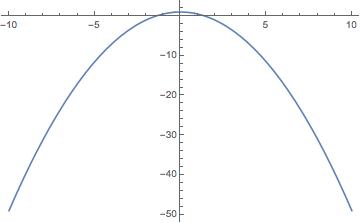my solution to mathe model test
1.population
data1 = {101654, 103008, 104357, 105851, 109300, 111026, 112704,
114333, 115823, 117171, 118517, 119850, 121121, 122389, 123626,
124810};
data = Table[{1982 + (i - 1), data1[[i]]}, {i, 1, 16}];
//exponential model
lnm = NonlinearModelFit[data, data1[[1]]*Exp[a*(x - 1982)], a, x,
Method -> "NMinimize"];
<!-- more -->
//logistic model
lnm1 = NonlinearModelFit[data,
a/(1 + (a/data1[[1]] - 1)*Exp[-b*(x - 1982)]), {a, b}, x,
Method -> "NMinimize"]
//plot two models
Show[ListPlot[data], Plot[lnm[x], {x, 1982, 2000}]]
Show[ListPlot[data], Plot[lnm1[x], {x, 1982, 2000}]]
//illustrate the resid plot
ListPlot[{(lnm /@ data1 - data2)^2, (lnm1 /@ data1 - data2)^2},
PlotLegends -> Automatic]
//make the prediction
lnm[2015]
lnm1[2015]
Take care of the method in case its invalidability.
method should be set “NMinimize“ to find the overall solution.
exponential model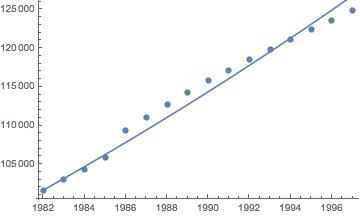
logistic model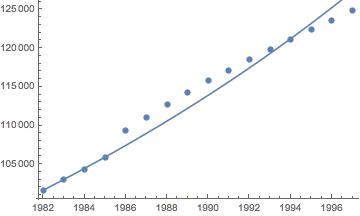
resid plot of two models.
orange represents model1, while blue represents model2
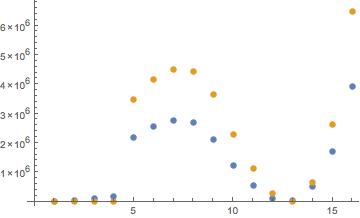
Take care of the method in case its invalidability.
method should be set “NMinimize” to find the overall solution.
3.wolf and sheep
//solution to diffrential equation should be obtrained from N methods.
sl = NDSolve[{x'[t] ==
2*(-60 - x[t])/Sqrt[(-60 - x[t])^2 + (t - y[t])^2],
y'[t] == (t - y[t])/Sqrt[(-60 - x[t])^2 + (t - y[t])^2],
x[0] == 0, y[0] == 0}, {x[t], y[t]}, {t, 0, 60}];
ParametricPlot[Evaluate[{x[t], y[t]} /. sl], {t, 0, 60}];
Show[%, ParametricPlot[{-60, t}, {t, 0, 60}]]
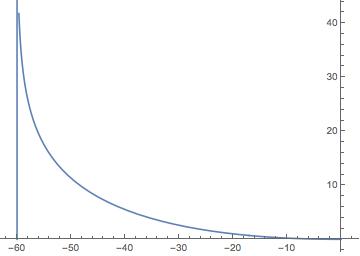
it’s easy for us to discover that wolf was not fast enough to caught the sheep.
4.Integration
//calc and output the numeric answer
Integrate[1/Sqrt[2*Pi]*Exp[-x^2/2], {x, 0, 1}]//N
5.Optimization
//local minimum
FindMinimum[3*x^2 + 10*y^2 + 3*x*y - 3*x + 2*y, {{x, 0}, {y, 0}}]
//minimize(overall optimize)
//In Lingo, x, y are automatically constrained to be big than 0, thus triggerring our @free(x) @free(y) steps .
Minimize[3*x^2 + 10*y^2 + 3*x*y - 3*x + 2*y, {x, y}]
differences between minimum and minimize should be given enough attention
6. Diffrential equation
ans = NDSolve[{y''[t] - 7*(1 - y[t]^2)*y'[t] + y[t] == 0, y[0] == 1,
y'[0] == 0}, y[t], t];
Plot[Evaluate[y[t] /. ans], {t, -10, 10}]
it’s necessary to use N method.
And the plot is clear